Introduction
In the dynamic world of software development, the quest for efficiency and quality is relentless. As developers face the increasing complexity of codebases, the need for actionable insights has never been more critical. Code insights, derived from meticulous analysis of programming practices, serve as a beacon for teams striving to enhance their productivity and software quality.
With tools like Kodezi CLI at their disposal, developers can swiftly identify inefficiencies, automate debugging processes, and foster a culture of continuous improvement. This article delves into the transformative power of code insights, exploring how they not only streamline development workflows but also empower teams to deliver innovative solutions with confidence.
As organizations navigate the challenges of modern software demands, embracing these insights will be key to unlocking their full potential.
Defining Code Insights: An Overview
Code analysis denotes the code insights obtained from examining codebases to reveal patterns, inefficiencies, and opportunities for improvement. These understandings, bolstered by tools like Kodezi CLI, empower developers to enhance programming productivity by autonomously improving code quality and fixing bugs before they reach production. By utilizing this knowledge, teams can make strategic decisions regarding optimizations, refactoring, and adherence to best practices, ultimately leading to improved software quality and maintainability.
In an era where efficiency is paramount, these code insights have become indispensable in modern software development. With over 8.2 million developers utilizing Python and substantial contributions from nations such as China and India, the need for effective programming analysis techniques has never been more pronounced. As John Doe, a Senior Developer, notes, 'The most significant impact that artificial intelligence large language model applications had on my productivity is writing natural language.'
This underscores the transformative potential of incorporating advanced analytical tools into CI/CD pipelines, providing code insights that ensure teams can deliver innovative, secure, and efficient solutions. Moreover, trends suggest that by 2025, 95% of all commercial software will include open-source components, reflecting a collaborative method that highlights the significance of code understanding in enhancing software quality metrics. To get started quickly, users can refer to the '5-minute quick start guide' and see a demo that showcases Kodezi CLI's features.
Working together with a talented software development team can further improve the effectiveness of these findings, facilitating the delivery of innovative solutions.
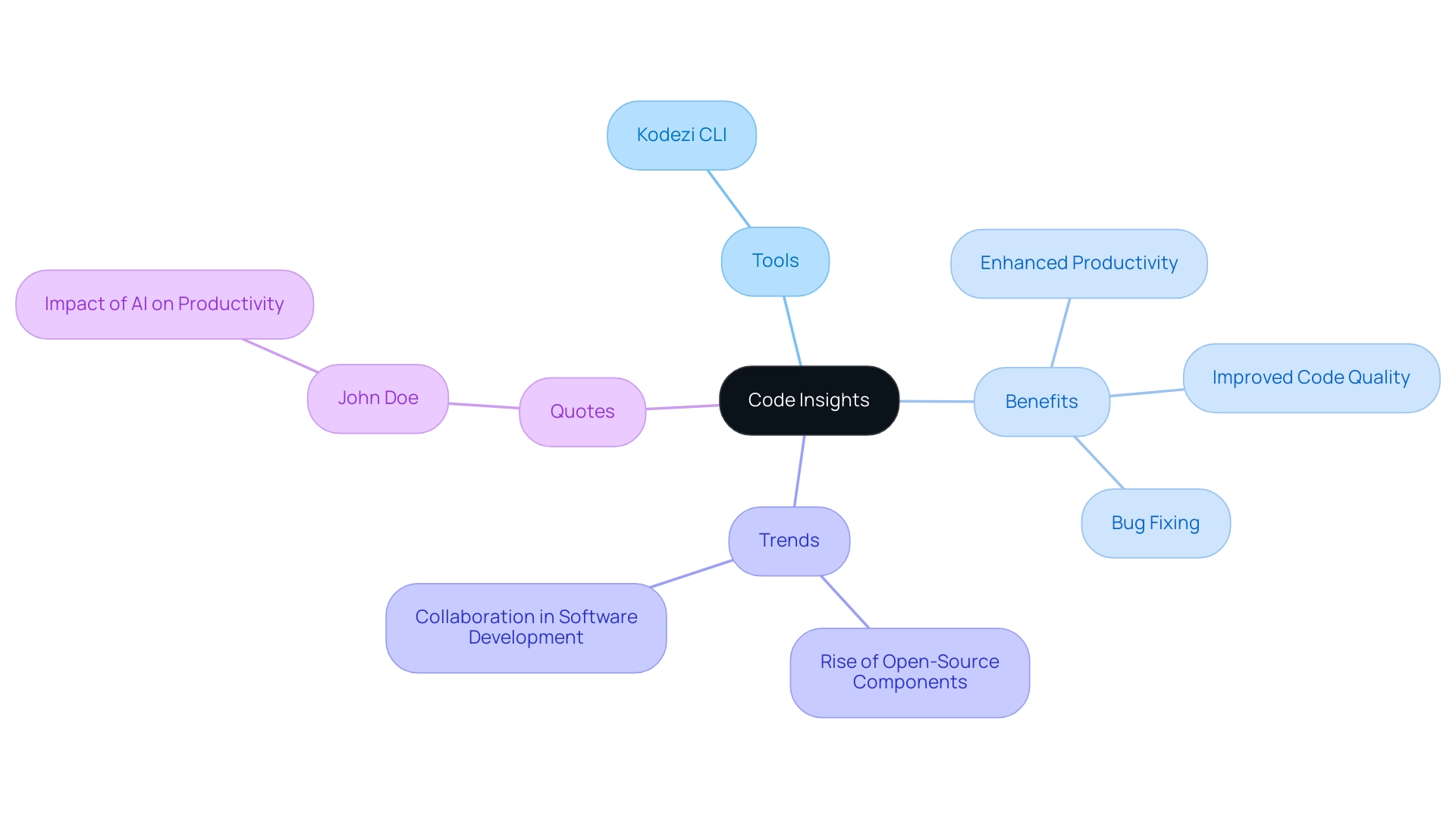
The Role of Code Insights in Enhancing Software Development
Code insights serve as an essential guide for developers, empowering them to significantly refine their coding practices. By utilizing advanced tools such as CLI, developers can automate debugging, quickly identify performance bottlenecks, enhance security compliance, and improve formatting, all in a matter of seconds. This rapid issue resolution allows for effective code refactoring that enhances both performance and maintainability.
For example, observations produced from the automated analysis can reveal inefficient algorithms that impede application performance, allowing teams to tackle these problems quickly. The CLI offers comprehensive explanations regarding what went wrong and how it was resolved, which is essential for enhancing software performance. This not only leads to the delivery of higher-quality software at a faster pace but also enhances user satisfaction while effectively reducing technical debt.
Acknowledging technical debt as a main inefficiency—leading to more bugs, delayed feature development, and elevated maintenance costs—utilizing code insights is essential for enhancing software performance. Furthermore, integrating Graphite Insights enhances code review performance monitoring with advanced analytics and reporting capabilities, reinforcing the argument for their adoption.
As David Mora Guerrero, a Machine Learning Engineer at HatchWorks, asserts,
'We’ll continue to optimize our approach and inclusion of these AI tools in our processes and equip our Nearshore developers with the education and resources they need to be efficient with them.'
This perspective emphasizes the significance of adopting methodologies driven by code insights to ensure robust software development practices and enhance overall programming productivity.
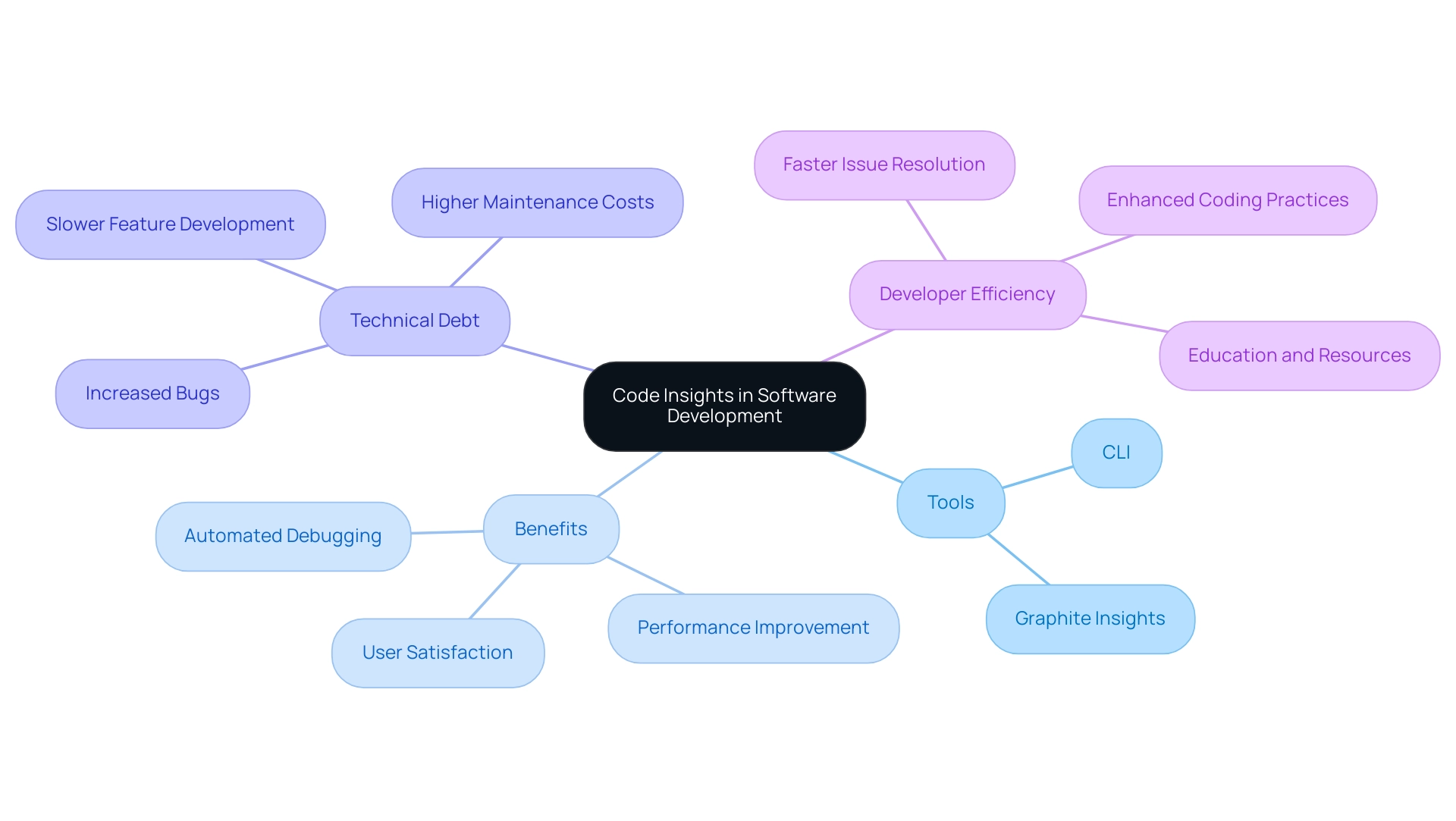
Tools and Technologies for Generating Code Insights
In the rapidly evolving landscape of software development, tools like Kodezi CLI emerge as a game-changer for B2B engineering groups, autonomously improving codebases and fixing bugs before they reach production. With a quick 5 minute quick start and the option to see a demo, groups can quickly harness its capabilities. Static analysis tools like SonarQube and ESLint empower developers with real-time feedback on quality, enabling them to identify and rectify potential issues before they escalate into significant problems.
This is increasingly essential as the static analysis market is projected to grow from USD 1.28 billion in 2023 to nearly USD 3.35 billion by 2030, reflecting a compound annual growth rate (CAGR) of 14.7%. Kodezi CLI boosts programming efficiency by serving as a versatile tool that auto-repairs codebases, ensuring that groups uphold high standards of quality. Moreover, the arrival of KodeziChat offers an AI-driven solution for rapid programming question resolution and problem-solving, additionally enhancing the development process.
Performance profiling tools such as New Relic and Dynatrace complement these solutions by providing robust monitoring capabilities to identify bottlenecks during runtime, thus enhancing application performance. The challenges faced in this market, including competitive pricing pressures and the need for continuous technological investment, underscore the importance of strategic recommendations such as investing in supply chain resilience and fostering partnerships. By leveraging these advanced tools, development teams can achieve comprehensive code insights into their codebases, fostering an environment where data-driven optimizations are not only possible but highly effective.
The incorporation of such tools greatly enhances productivity and efficiency, aligning with the rising need for developers to uphold high standards in programming quality amidst escalating cybersecurity challenges, evidenced by a 13% increase in cybercrime reports in Australia in 2022. Kodezi CLI truly embodies 'The B2B Swiss Army Knife for Engineering Teams.
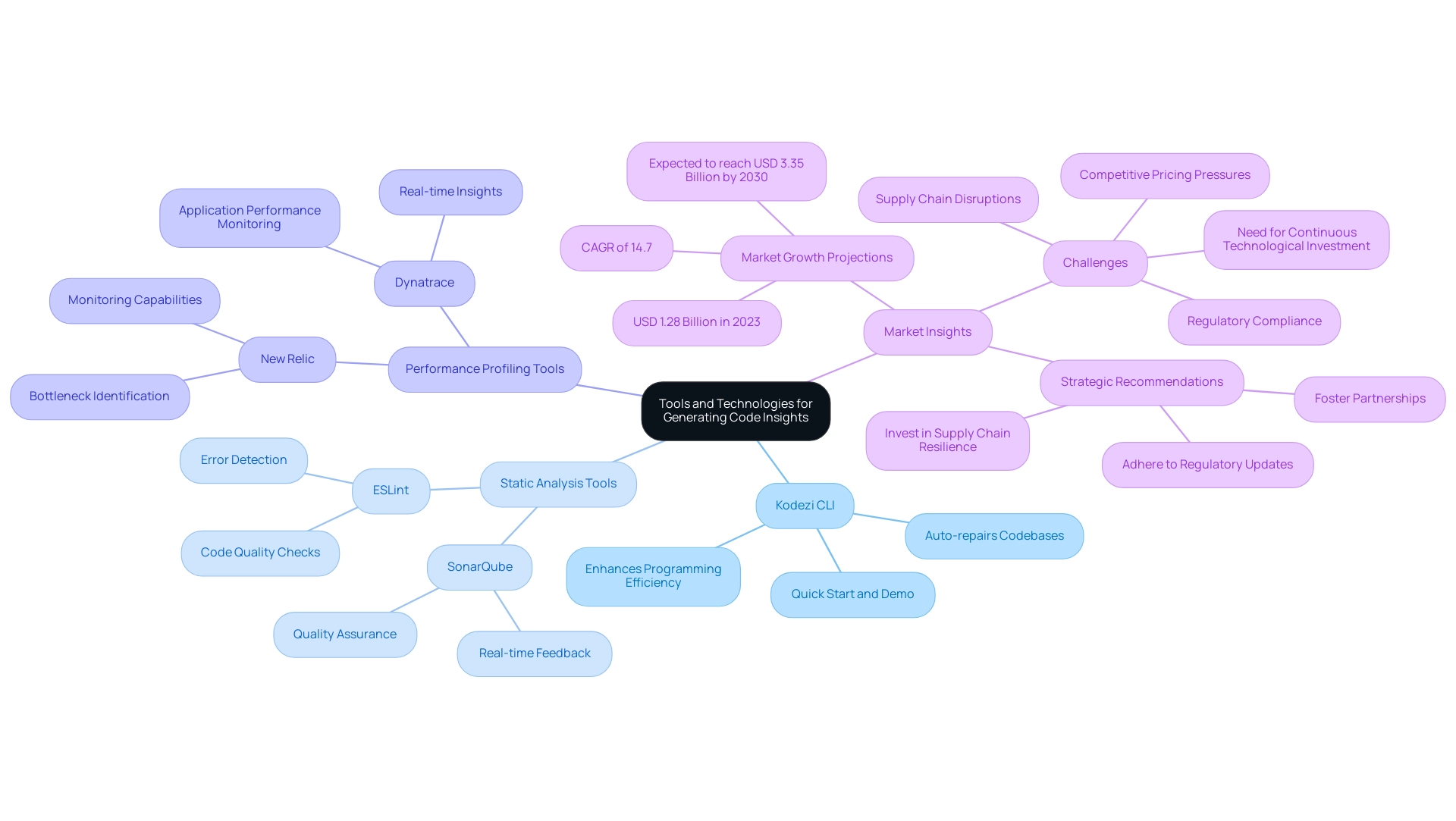
Benefits of Implementing Code Insights in Development Teams
Incorporating programming insights into development groups yields significant benefits, markedly enhancing quality, improving collaboration, and increasing productivity. Current statistics indicate that employees are only averaging 11.2 hours per week on productive work, whereas they aspire to spend at least 20 hours focused on high-value tasks. This gap underscores the importance of optimized workflows.
By identifying and rectifying inefficiencies through code analysis, teams can minimize the time allocated to debugging and refactoring, thereby redirecting their efforts towards developing innovative features. User testimonials reveal that the platform has transformed debugging for over 1,000,000 programmers. One user stated, 'Kodezi has helped me find and fix bugs faster and easier than trying to manually.
It is a lifesaver when it comes to correcting issues and bugs.' Another user remarked, 'I love what this platform is doing with debugging, feels like I just unlocked a new superpower!' Such feedback highlights the platform's role in fostering a more productive coding environment.
Moreover, Kodezi's ability to optimize, convert, and generate remarks on programming further enhances its effectiveness. Code insights enhance communication among group members. A shared understanding of code insights not only promotes collaborative problem-solving but also aligns group efforts towards common objectives.
As highlighted in a recent study, 50.8% of users who utilized Reclaim.ai's time tracking features reported an increase in their productive work hours. Furthermore, investing in employee training and development demonstrates support for members' growth, which can lead to improved motivation and performance. An engineering group leader remarked, 'It has drastically improved our engineering group's productivity and allowed us to focus on higher-level tasks.'
Furthermore, specialists concur that program examination improves group cooperation by offering clear metrics that everyone can strive for. The tactical execution of programming knowledge ultimately results in a more efficient development lifecycle, leading to the delivery of exceptional software products and improved group performance.
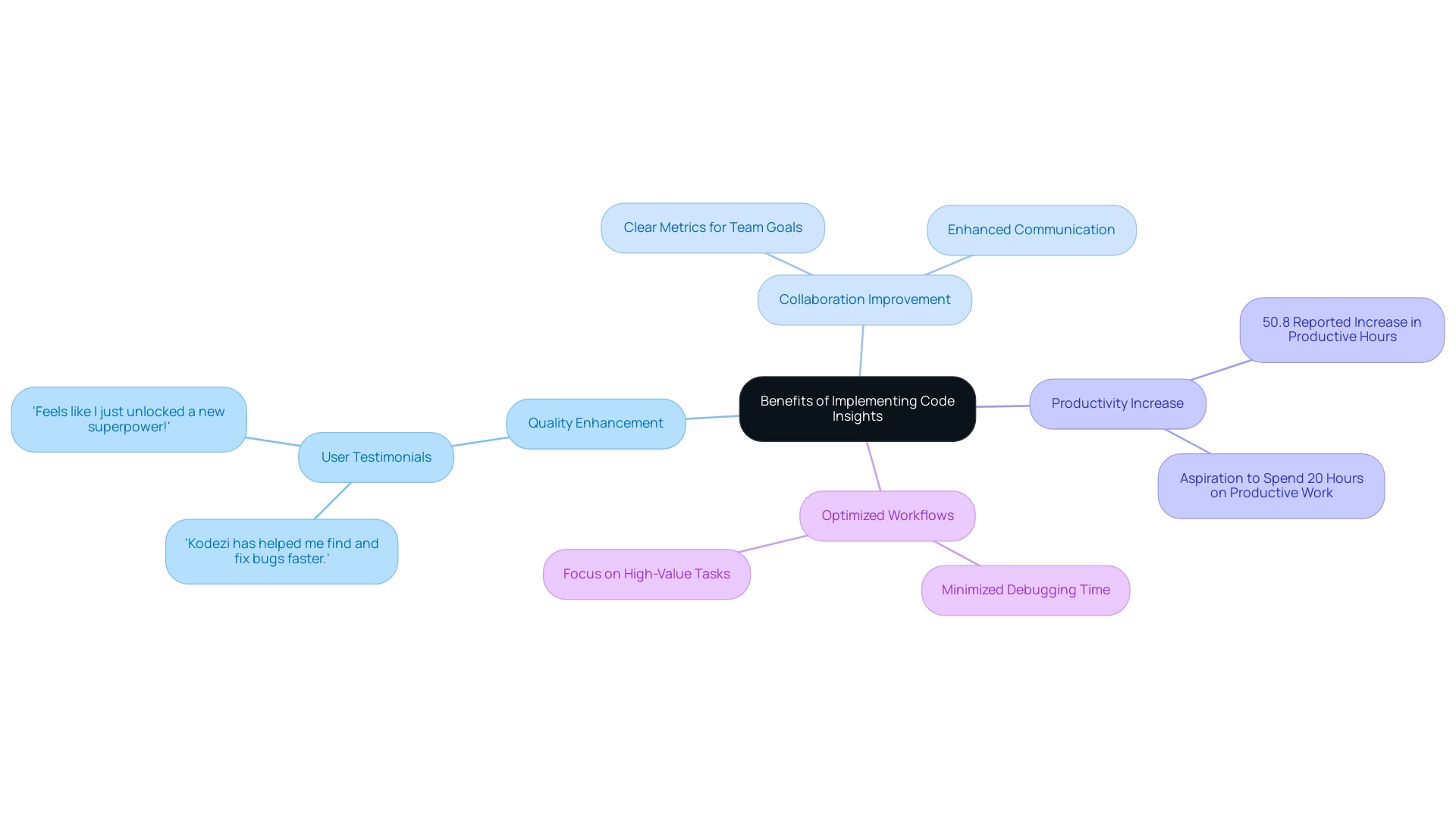
Challenges and Limitations of Code Insights in Practice
While the execution of code knowledge can significantly enhance development processes, teams must navigate several challenges and limitations. A prevalent issue is the risk of information overload; with a plethora of metrics available, developers often find it difficult to discern which observations warrant attention. This is where the CLI comes into play, providing a Swiss-Army Knife for programmers to auto-heal codebases in seconds, never waste time on a pull request ever again, drastically reducing the time spent on pull requests.
Research indicates that 80% of developers recognize the critical role of soft skills, such as communication, in effectively tackling these challenges. Moreover, the efficacy of code insights depends on the accuracy and relevance of the analysis tools employed. As highlighted by Ayoob Ibrahim, a talent sourcing specialist, data governance is becoming an obvious investment for organizations, emphasizing the need for dependable systems.
By leveraging Kodezi CLI, groups can not only navigate chaos more efficiently but also boost their coding skills through free trials and demos. It's essential to remember that data groups are ultimately collections of individuals trying to manage complexity, and maintaining a sense of humor about their challenges can foster a more resilient working environment. Furthermore, the recent merging of Statsig with Azure AI illustrates how programming knowledge can be effectively employed to set up and enhance AI applications, although it also emphasizes the difficulties that groups may encounter during execution.
Furthermore, the tradeoff between quality and speed in machine learning project development is crucial; the pressure to deliver quickly can compromise both the final product and ethical standards. By remaining vigilant about these challenges and leveraging Kodezi CLI, development teams can better harness the advantages of code insights, ultimately ensuring they derive the maximum value from their analytical efforts.
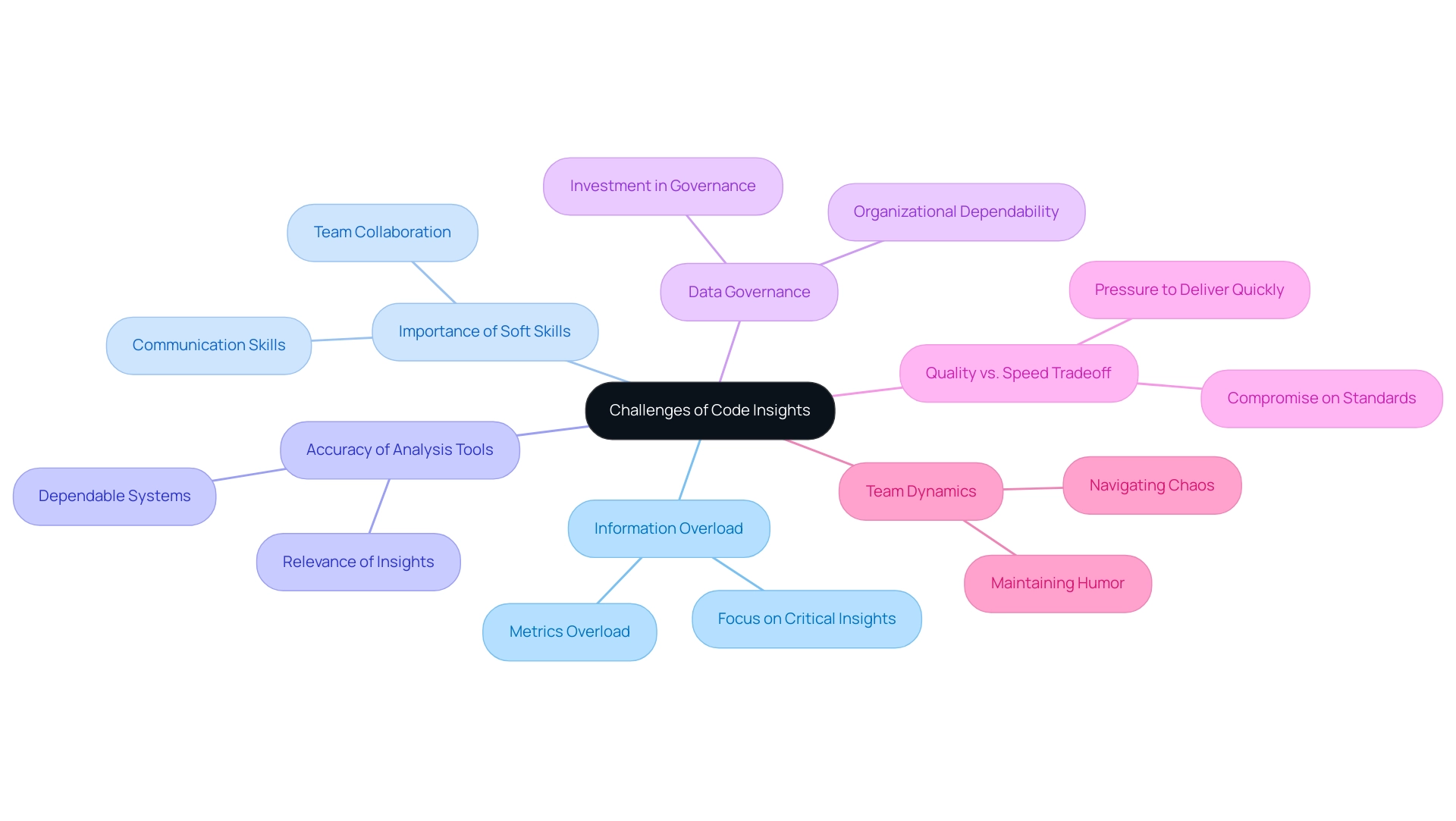
Conclusion
Embracing code insights is a transformative step for software development teams seeking to enhance efficiency and quality. By leveraging tools like Kodezi CLI, developers can automate debugging processes, identify performance bottlenecks, and improve overall code quality. This not only accelerates development timelines but also fosters a culture of continuous improvement, allowing teams to focus on innovation rather than getting bogged down by technical debt.
The integration of code insights into development workflows brings substantial benefits, including improved collaboration and productivity. As teams become more aligned with shared metrics and goals, they can work together more effectively to deliver superior software products. Real-world testimonials illustrate the profound impact that tools like Kodezi have on debugging efficiency, empowering developers to resolve issues swiftly and seamlessly.
However, it is essential to remain mindful of the challenges that come with implementing code insights. Information overload and the need for accurate analysis tools can complicate the process. Yet, with the right strategies and tools in place, such as Kodezi CLI, teams can navigate these challenges and unlock the full potential of their codebases. By harnessing the power of code insights, organizations position themselves to thrive in an increasingly complex software landscape, ensuring they remain competitive and innovative in delivering high-quality solutions.
Frequently Asked Questions
What is code analysis?
Code analysis refers to the insights gained from examining codebases to identify patterns, inefficiencies, and opportunities for improvement, ultimately enhancing programming productivity and code quality.
How do tools like Kodezi CLI assist developers?
Tools like Kodezi CLI help developers autonomously improve code quality and fix bugs before they reach production, enabling strategic decisions about optimizations, refactoring, and adherence to best practices.
Why are code insights important in modern software development?
Code insights are essential for improving software quality and maintainability, especially in an era where efficiency is crucial, and many developers rely on programming analysis techniques.
What impact do artificial intelligence tools have on developer productivity?
AI tools, such as large language model applications, significantly enhance productivity by streamlining tasks like writing and debugging, as noted by developers in the field.
What trends are expected in commercial software by 2025?
By 2025, it is anticipated that 95% of all commercial software will incorporate open-source components, emphasizing the importance of code understanding for improving software quality metrics.
How can developers quickly get started with Kodezi CLI?
Users can refer to the '5-minute quick start guide' and view a demo showcasing Kodezi CLI's features to get started quickly.
What are the benefits of using code insights for debugging and performance?
Code insights allow for rapid issue resolution, enabling developers to automate debugging, identify performance bottlenecks, enhance security compliance, and improve code formatting efficiently.
How does addressing technical debt relate to code insights?
Utilizing code insights is essential for managing technical debt, which can lead to more bugs, delayed feature development, and increased maintenance costs, thus enhancing overall software performance.
What is the role of Graphite Insights in code review?
Integrating Graphite Insights enhances code review performance monitoring with advanced analytics and reporting capabilities, supporting the adoption of code insights.
What do experts say about the integration of AI tools in software development?
Experts emphasize the importance of optimizing the inclusion of AI tools in development processes to enhance efficiency and equip developers with the necessary resources and education.




